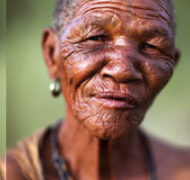Aging Well with Dr. Dan Blazer, Part 1
Blog / Produced by The High Calling
Laity Leadership Institute senior fellow Dan Blazer, M.D., PhD. describes himself as a “prototypical academic psychiatrist,” but the path to his specialty in geriatric psychiatry was anything but typical.
Blazer spent two years as a young medical missionary in Cameroun and Nigeria, where he ran a mobile clinic in remote villages. He was impressed by the good mental health of the elderly he encountered among the 150-200 patients he treated every day.
“If a person survived into late life relatively healthy, they did exceptionally well, so I was curious what it was about being in that society that permitted these older people to do as well as they did,” said Blazer.
When he arrived at Duke University in Durham, North Carolina, to begin his psychiatric residency, he discovered that Duke houses a national center for the study of aging.
“I immediately got involved with the aging center and basically have been doing geriatric psychiatry ever since. But I think the stimulus was the work in Africa where I saw these very healthy people aging,” he said.
Asked what led to good geriatric health in the Africans he encountered, Blazer said the elderly people he met were survivors.
“Many people would die between the ages of 30 and 55. They would get malaria or other serious diseases. Those who survived to the age of 60 were likely to be genetically very strong and tended to do well. In the U.S., we have better physical supports: better nutrition, etc. People survive into late life, but they may not be as healthy,” said Blazer.
Older people are treated with more respect in societies where there are fewer of them, according to sociologists, and that respect gives them vitality too, he said.
“In Africa, very definitely older people were revered. If they reached the age of 60 or 70, they really were looked upon to be the repositories of wisdom in the tribes where they lived. They were the people that were called upon for advice. You don’t tend to see that here as much because there are more elderly people,” said Blazer. “I even think we may be verging on kind of an inter-generational warfare now, given the debates about Medicare and social security, because we have so many older people compared to younger people,” he said.
Asked what Americans can learn from African culture, Blazer said, “In African society, even though their history was oral, they valued their history. They believed what had gone before helped create them to be what they were now. I’ve think we’ve really lost our sense of history, and that has eroded the foundation upon which our society is built. There is a sense that our history is not relevant any more. It’s sort of like the 40-year-olds who are running our churches don’t think 60- and 70-year-olds have anything to offer whatsoever, but there is wisdom embedded there from which to draw.”
Older people also played meaningful roles in the African communities where Blazer worked. For example, grandmothers often took care of children because mothers were out working in the fields.
“As a society, we have not thought so much about what the meaningful roles of older people might be,” he said.
Blazer, however, has been thinking and writing about the topic of geriatric health for more than 30 years. As an academic psychiatrist, his career centers on research and administrative work, but he also does some teaching and clinical work. He is an active participant in Duke’s Center for Theology, Spirituality, and Health. Although he thinks about the integration of psychiatry and spirituality a lot, the topic is not his main focus, he said.
“My most important witness is as someone who has established himself in academic psychiatry, but who maintains a very strong Christian identity that’s recognized,” said Blazer.
The problem of geriatric depression has been at the forefront of Dr. Blazer’s interests for most of his career. In the coming weeks, we will examine this and other topics related to aging well. I hope you’ll join the conversation.
Image by Dietmar Temps. Used with permission. Sourced via Flickr. Post by Christine A. Scheller.
Laity Leadership Institute senior fellow Dan Blazer, M.D., PhD. is vice chair of faculty in the Department of Psychiatry and Behavioral Sciences and Vice Chair of academic development at Duke University Medical Center in Durham, North Carolina. Dr. Blazer is a geriatric psychiatrist and an epidemiologist and is the author of numerous books. He is also co-editor of Essentials of Geriatric Psychiatry, which is scheduled for release in 2012.





